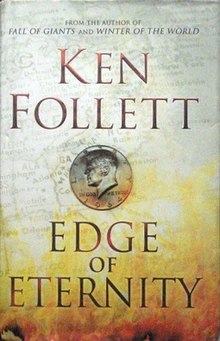
"Ich bin ein Berliner" is a speech by United States President John F. Kennedy given on June 26, 1963, in West Berlin. It is one of the best-known speeches of the Cold War and among the most famous anti-communist speeches.
Spy fiction is a genre of literature involving espionage as an important context or plot device. It emerged in the early twentieth century, inspired by rivalries and intrigues between the major powers, and the establishment of modern intelligence agencies. It was given new impetus by the development of fascism and communism in the lead-up to World War II, continued to develop during the Cold War, and received a fresh impetus from the emergence of rogue states, international criminal organizations, global terrorist networks, maritime piracy and technological sabotage and espionage as potent threats to Western societies. As a genre, spy fiction is thematically related to the novel of adventure, the thriller and the politico-military thriller.

The Illuminatus! Trilogy is a series of three novels by American writers Robert Shea and Robert Anton Wilson, first published in 1975. The trilogy is a satirical, postmodern, science fiction–influenced adventure story; a drug-, sex-, and magic-laden trek through a number of conspiracy theories, both historical and imaginary, related to the authors' version of the Illuminati. The narrative often switches between third- and first-person perspectives in a nonlinear narrative. It is thematically dense, covering topics like counterculture, numerology, and Discordianism.

Historical fiction is a literary genre in which a fictional plot takes place in the setting of particular real historical events. Although the term is commonly used as a synonym for historical fiction literature, it can also be applied to other types of narrative, including theatre, opera, cinema, and television, as well as video games and graphic novels.
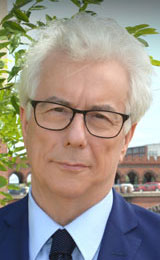
Kenneth Martin Follett, is a Welsh author of thrillers and historical novels who has sold more than 160 million copies of his works.

The End of Eternity is a 1955 science fiction novel by Isaac Asimov with mystery and thriller elements on the subjects of time travel and social engineering. Its ultimate premise is that of a causal loop, a type of temporal paradox in which events and their causes form a loop.
Genre fiction, also known as formula fiction or popular fiction, is a term used in the book-trade for fictional works written with the intent of fitting into a specific literary genre in order to appeal to readers and fans already familiar with that genre.
The Three Californias Trilogy consists of three books by Kim Stanley Robinson, which depict three different possible futures of Orange County, California. The three books that make up the trilogy are The Wild Shore, The Gold Coast and Pacific Edge. Each of these books describes the life of young people in the three very different near-futures. All three novels begin with an excavation which tells the reader about the world they are entering.
The Historical Illuminatus Chronicles is a series of three novels by Robert Anton Wilson written after his highly successful The Illuminatus! Trilogy and his 1981 Masks of the Illuminati. His co-author from the first trilogy, Robert Shea, was not involved in this series, providing only a praising blurb.
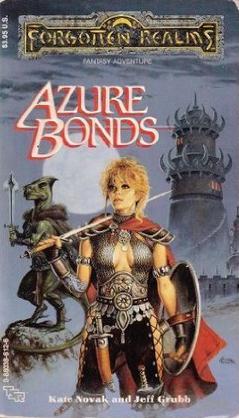
Azure Bonds is a 380-page paperback fantasy novel written by Kate Novak and Jeff Grubb, with cover art by Clyde Caldwell, and published by TSR Inc. in 1988. It is the first novel of the Finder’s Stone Trilogy which is set within the world of the Forgotten Realms. It served as the basis for the computer game, Curse of the Azure Bonds. One of the co-authors, Jeff Grubb, stated that of the novels he has written, Azure Bonds is one of his favorites.
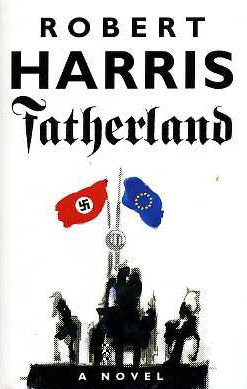
Fatherland is a 1992 alternative history detective novel by English writer and journalist Robert Harris. Set in a universe in which Nazi Germany won World War II, the story's protagonist is an officer of the Kripo, the criminal police, who is investigating the murder of a Nazi government official who participated at the Wannsee Conference. A plot is thus discovered to eliminate all of those who attended the conference, to help improve German relations with the United States.
The John F. Kennedy assassination and the subsequent conspiracy theories surrounding it have been discussed, referenced, or recreated in popular culture numerous times.

The Berlin Crisis of 1961 was the last major European political and military incident of the Cold War concerning the status of the German capital city, Berlin, and of post–World War II Germany. The crisis culminated in the city's de facto partition with the East German construction of the Berlin Wall.
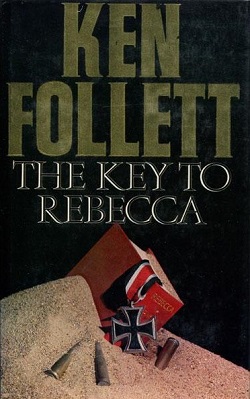
The Key to Rebecca is a novel by the British author Ken Follett. Published in 1980 by Pan Books (ISBN 0792715381), it was a best-seller that achieved popularity in the United Kingdom and worldwide. The code mentioned in the title is an intended throwback from Follett to Daphne du Maurier's famed suspense novel Rebecca.

Fall of Giants is a 2010 historical novel by Welsh author Ken Follett. It is the first part of the Century Trilogy which follows five interrelated families throughout the course of the 20th century. The first book covers notable events such as World War I, the Russian Revolution, and the struggle for women's suffrage. The sequel Winter of the World covers World War II and was published on September 18, 2012. The third book, Edge of Eternity, covers the Cold War and was published in 2014.
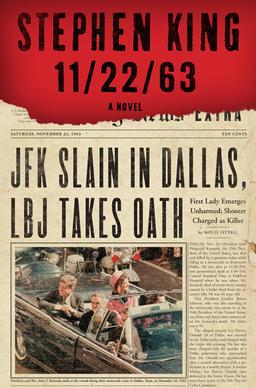
11/22/63 is a novel by Stephen King about a time traveller who attempts to prevent the assassination of United States President John F. Kennedy, which occurred on November 22, 1963. It is the 60th book published by Stephen King, his 49th novel and the 42nd under his own name. The novel was announced on King's official site on March 2, 2011. A short excerpt was released online on June 1, 2011, and another excerpt was published in the October 28, 2011, issue of Entertainment Weekly. The novel was published on November 8, 2011 and quickly became a number-one bestseller. It stayed on The New York Times Best Seller list for 16 weeks. 11/22/63 won the 2011 Los Angeles Times Book Prize for Best Mystery/Thriller and the 2012 International Thriller Writers Award for Best Novel, and was nominated for the 2012 British Fantasy Award for Best Novel and the 2012 Locus Award for Best Science Fiction Novel.
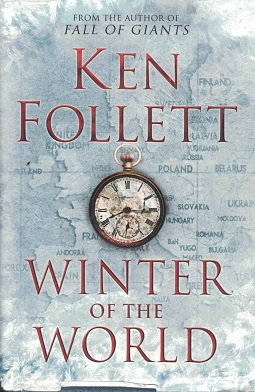
Winter of the World is a historical novel written by the Welsh-born author Ken Follett, published in 2012. It is the second book in the Century Trilogy. Revolving about a family saga that covers the interrelated experiences of American, Russian, German and British families during the 20th century, the novel follows the second generation of those families, born to the main characters of the first novel, Fall of Giants, and is followed by a further generation of those families in the third and final book in the series, Edge of Eternity.
Bibliography of science fiction, fantasy, historical fiction and nonfiction writer Harry Turtledove:
